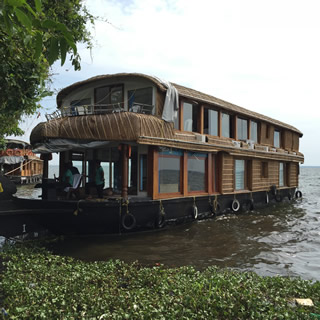Tourism and its environmental impacts - 1
Tourism and its environmental impacts - 1
by Andrew Bailey, Darren Lee, Utsav Sharma, Claire Lewis, Karl Jenner, Dona Davis, Sudipa Kadam
Excited, exhausted, enlightened: these words sum up Day 1 of our MBA Study Tour at Kerala.
Jet-lagged and travel weary, a two-hour bus ride from Kochi to Alapuzha would have afforded us some crucial forty winks. However, the sights, sounds, and smells stimulated our senses and allowed us to take in the environment.
Development appeared to be somewhat irregular with residential, commercial, and industrial developments sprouting up alongside each other on the main roads. What may be haphazard to our perspective may perhaps be strategic to local business, for being located along the road affords them high visibility to both visiting and local traffic.
Impacts of tourism: Employment
 We spoke to a boat driver and he said he preferred the opportunities the tourism industry offered. He was a fisherman in his previous work-life, and we surmised that employment in tourism provides seasonal, stable income as opposed to being exposed to the variability of fishing.
We spoke to a boat driver and he said he preferred the opportunities the tourism industry offered. He was a fisherman in his previous work-life, and we surmised that employment in tourism provides seasonal, stable income as opposed to being exposed to the variability of fishing.
Our local expert advised us that tourism has cultivated a degree of entrepreneurial tourism. For example, some local residents have established bed & breakfast or homestay accommodation to provide tourists with a more authentic experience.
Kuttanadu was once known as the rice bowl of the Kerala region. Locals toiled the paddy fields and received daily wages and rice for their labour. With the lure of tourism employment opportunities, locals have left one rice bowl for another, and a once self-sufficient rice region is now required to import rice from other Indian states.
Established international hotel chains have entered the market, attracting the lucrative tourism dollar into the region. One would assume that this would translate into more jobs for the locals; however, rather than invest in skills and training, hotels employ more readily skilled employees from outside the local area.
Environmental

More houseboats plying the backwaters and the lake has impacted on the natural habitat of fishes. Comparatively, the impact is not as damaging as popular tourist hotspots in the Asia region (e.g. Bali).
We feel that Kerala is in a pivotal position to take early action to stem the compounding effects of tourism on the environment.
Conclusion
Likely lasting impressions to stay with us relate to the hospitality received, and the greenery in the region. Authentic, pleasant, and genuine hospitality have impacted on us. The greenery provides both visual and physical respite from the heat and humidity.
The challenge for Kerala is that as tourism booms, will it may risk losing its authenticity and become akin to the other tourism hotspots like Bangkok and Bali, as everyone seeks to get a slice of the tourism pie?
Kerala provides an interesting contrast to other main destinations of India like Delhi and Mumbai. All aspects considered, the people of Kerala are their competitive advantage – they are friendly, laidback and authentic.
We feel that these qualities are inimitable and will hold Kerala in good stead to provide tourists with an experience of India like no other.
